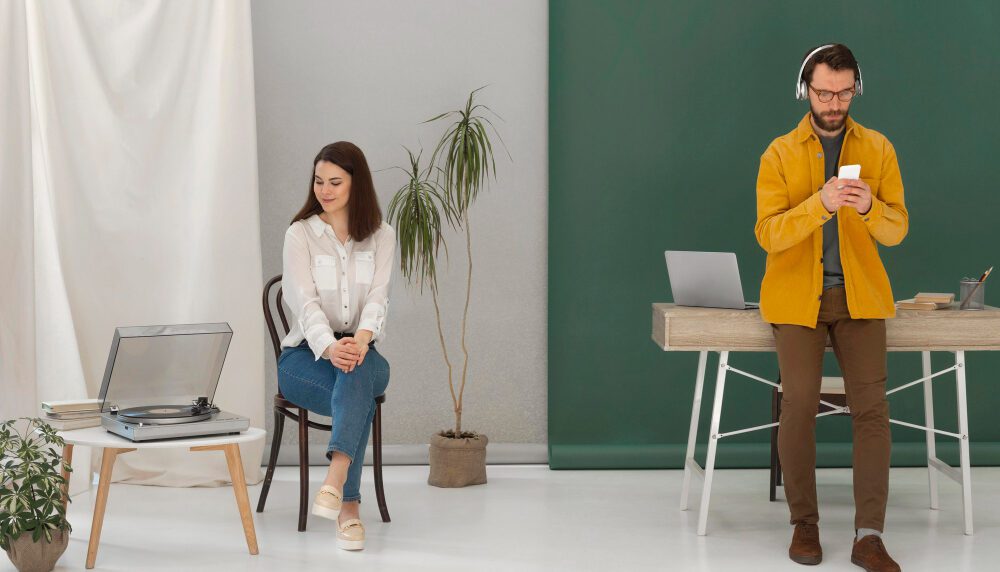
If you work in an office, you probably spend most of your day sitting at a desk. Have you ever wondered how sitting so much can affect your health? Or have you ever considered switching to a standing desk to see if there’s an overall difference to your comfort and health?
In this article, we’ll answer this widely-debated question: “is standing better than sitting?” After reading, you’ll have a better idea as to if you need to be doing more standing or sitting.
Sitting & Your Overall Health :
From reading emails to writing proposals, most office employees spend a significant amount of time seated at their desk. In fact, the average office worker sits for close to ten hours a day, and most of these hours are spent in front of a computer. And believe it or not, but prolonged sitting can be dangerous for your overall health.
Medical research has shown that prolonging sitting puts you at a significantly higher risk for the following health issues:
- Heart disease
- Diabetes
- Obesity
- Cancer
- Depression
- Muscle and joint problems
Curious as to why sitting puts you at increased risk for heart disease? Well, when you sit for a prolonged period, blood pools in your legs and that blood is hard to pump back up to the top of your body, which increases your risk of heart disease.
Sitting can also be an uncomfortable position for your body and can increase oxidative stress, which will damage cells in your body and increase inflammation. This is not good for your heart.
To make things scary, a 2012 study found that people who sat for 11 hours or more a day had a 40% higher risk of dying in the next three years than people who sat for less than that time.
And while morning walks and trips to the gym are great for your body, they can’t make up for prolonged sitting. In fact, experts say you should stand for at least 2 hours during the workday to avoid the health effects associated with prolonged sitting.
Standing and Your Overall Health :
In general, prolonged standing offers greater health benefits than sitting. It reduces your risk of weight gain and obesity and helps you avoid the sedentary lifestyle that is most often associated with sitting. Standing also lowers your blood sugar and cholesterol level, which can decrease your risk for heart disease.
Standing can also lower your risk of type 2 diabetes and other metabolic diseases, reduce your risk of cancer, and even lower your long-term mortality list. Here are some of the other great benefits of standing:
Energy and Metabolism :
Did you know that people who use standing desks report feeling less stress and fatigue than people who don’t?
By introducing short intervals of movement and standing to your work routine, you can also improve your blood flow and boost your metabolism, which will ultimately help burn fat.
Productivity & Alertness :
People who stand and move around more often generally feel more productive, happier, and more and alert. This is because the movement causes the blood flow to your brain to increase, which will stimulate brain function and help improve your concentration.
Is Standing Better Than Sitting?
As evident above, standing at work can offer many benefits, such as increased concentration to even reduced risk for heart disease. Sitting, on the other hand, can lead to a variety of health and postural problems. Here are the most common ones:
Strained Neck :
People, who sit at a desk for a prolonged period of time have a habit of stretching their neck toward their keyboard and monitor? This can strain the vertebrae and leave you with a strained neck.
Sore Shoulders & Inflexible Spine :
People who sit tend to slump forward, which causes them to overextend their shoulder muscles. Because of this, they’ll round their shoulders and chest inwards, and that will cause their shoulders and upper back to tense up.
Prolonged sitting also causes the collagen around the tendons and ligaments in our spine to harden, and that not only restricts our range of motion, but it makes us more susceptible to injury.
Weakened Abs & Glutes :
If you sit for long periods of time, your abdominal muscles experience little to no engagement. This will cause them to weaken. Like abs, glutes are basically unused when sitting, which will make it difficult to maintain your overall mobility and agility.
As you can see, prolonged sitting can be quite dangerous to your health. So, if possible you should spend as much time as you can stand during the day to avoid these issues.
How to Start Standing More at Work :
Want to start standing more at work? Here are some easy ways to change your sedentary ways at work.
Get a Standing Desk :
If you spend a lot of your time at your desk, it may be best to invest in a standing desk. You’ll be on your feet more often, which will put less of a strain on your back.
When using a standing desk, make sure your screen and surface are properly adjusted for your height, as your monitor should be at eye level.
It’s important to know that you should avoid exclusively standing, however, and try to break up long periods of standing with some sitting. A standing desk balance board will offer you active standing, which will keep your body moving to avoid stiffness or back strain.
Stand Up Whenever Possible :
If you must sit, try to find as many opportunities as possible to stand up. Stand up during phone calls and when you go to great someone who stops by your desk.
You should also consider standing at the back of the room during presentations or meetings to avoid prolonged sitting.
Walk Whenever and Wherever You Can
The key to overall office health is avoiding too much sitting or standing. Try to walk whenever possible, whether that’s walking to a coworker’s desk to chat or taking a lap around the office every hour just to get some walking in.
And if possible, take your lunch break as an opportunity to go for a walk or hit the gym.
Standings vs. Sitting: Final Thoughts :
Now you know the answer to your question, “is standing better than sitting?” By standing more often, walking whenever possible, and investing in comfortable ergonomic furniture, you can work comfortably and stay healthy.
Do you work in a 9-5 environment? Have any extra tips on standing more often, or ergonomic furniture options we should know about? Tell us more in the comments!
Read Also :




























